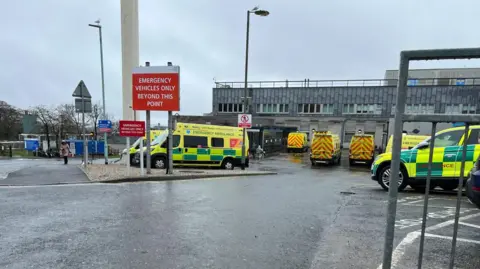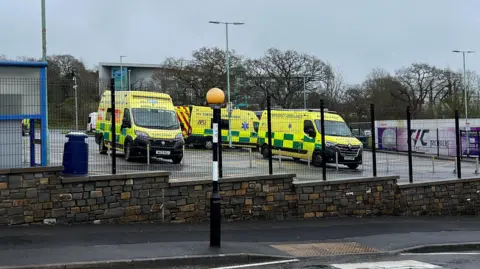Boy could have reached hospital sooner - inquest
 BBC
BBCA child critically ill with sepsis would have arrived earlier at hospital had a 111 operator graded his call as life-threatening, an inquest has heard.
Kayleigh Kenneford called 111 on the evening of 7 July, 2022 because her three-year-old son Theo Tuikubulau was unwell, a jury at County Hall in Exeter was told.
The inquest heard ambulance crews took 90 minutes to reach Theo's home in Torpoint, Cornwall, due to the grading given to the call.
The jury was told Theo died the next day from sepsis, caused by an "invasive" Strep A infection. The inquest continues.
Before Ms Kenneford made the 111 call on 7 July, Theo had already been admitted and discharged from Plymouth's Derriford Hospital the previous day with a suspected upper respiratory infection, the inquest heard.
For the previous 36 hours before the call, Theo had been gradually getting sicker with a high temperature, flu-like symptoms, breathing difficulties and was reluctant to drink or eat, the hearing was told.
Devon Coroner's Court heard 999 calls to South West Ambulance Service Trust and the 111 service use different pathways for grading emergencies.
The ambulance trust's Advanced Medical Priority Dispatch System (AMPDS) graded Theo's breathing difficulties as a category one on 6 July, while the 111 service's NHS Pathway ranked similar symptoms as a category two the following day, the court heard.
This meant crews took 90 minutes to reach Theo after Ms Kenneford first phoned for an ambulance shortly before 23:00 on 7 July.
'Hypotheticals'
Theo was taken back to Derriford - arriving shortly after 01:00 BST - where he died a few hours later.
Jon Knight, head of emergency operations at South West Ambulance Service Trust, had reviewed the 111 call and was asked what would have happened if it had been made to the ambulance service instead.
"My belief is based on the trigger phrase that the patient was fighting for breath at the time, it would have triggered a cat one through the AMPDS system," he said.
Mr Knight told the hearing he was dealing with "hypotheticals" as to how quickly a category one ambulance that night would have reached Theo.
He added while it was "hard to commit to a time", it probably would have been a 30-minute wait.

Louise Wiltshire, assistant coroner for Devon, asked Mr Knight about the evidence of Ms Kenneford, in which she said she was told by the 111 call handler an ambulance would not be long.
Mr Knight said paramedics are trained to not give people any indication of response times.
He added they would try to manage patient expectations and give clear instructions to call back if their condition worsened.
He added having reviewed documents relating to Theo's care that evening, the ambulance crew had recognised he was seriously unwell and had taken him straight to Derriford Hospital.
Mr Knight said he felt the crew had made all the "appropriate and correct decisions".
Andrew Morse, representing Theo's family, suggested if the call on 7 July had been assessed as a category one then he could have potentially arrived at the hospital by 23:45 BST.
"On balance, given the testimony I've already given to the coroner, I think that that's a reasonable assumption," Mr Knight replied.
The ongoing inquest heard there was a paramedic crew who could have reached Theo within 33 minutes had his call been graded as category one.
Follow BBC Cornwall on X, Facebook and Instagram. Follow BBC Devon on X, Facebook and Instagram. Send your story ideas to [email protected].
